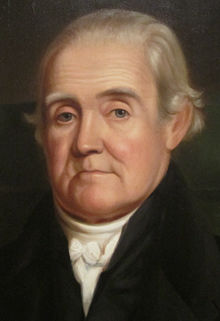Noah Webster
| Noah Webster | |
|---|---|

Noah Webster in an 1833 portrait by James Herring
|
|
| Member of the Connecticut House of Representatives | |
|
In office 1800; 1802 – 1807 |
|
| Personal details | |
| Born |
Noah Webster, Jr. October 16, 1758 Western Reserve of Hartford,Connecticut, British America |
| Died | May 28, 1843 (aged 84) New Haven, Connecticut, U.S. |
| Resting place | Grove Street Cemetery in New Haven, Connecticut |
| Political party | Federalist |
| Spouse(s) | Rebecca Greenleaf Webster (m. 1789) |
| Children | 8 |
| Residence |
|
| Alma mater | Yale University |
| Occupation | |
| Religion | Christianity (Congregationalist) |
| Military service | |
| Allegiance |
|
| Service/branch |
|
| Battles/wars | American Revolutionary War |
Noah Webster, Jr. (October 16, 1758 – May 28, 1843) was an American lexicographer, textbook pioneer, English-language spelling reformer, political writer, editor, and prolific author. He has been called the "Father of American Scholarship and Education". His blue-backed speller books taught five generations of American children how to spell and read, secularizing their education. According to Ellis (1979), he gave Americans "a secular catechism to the nation-state."
Webster's name has become synonymous with "dictionary" in the United States, especially the modern Merriam-Webster dictionary that was first published in 1828 as An American Dictionary of the English Language.
Webster was born in the Western Division of Hartford (which became West Hartford, Connecticut) to an established family. His father Noah Sr. (1722–1813) was a descendant of Connecticut Governor John Webster; his mother Mercy (Steele) Webster (1727–1794) was a descendant of Governor William Bradford of Plymouth Colony. His father was primarily a farmer, though he was also deacon of the local Congregational church, captain of the town's militia, and a founder of a local book society (a precursor to the public library). After American independence, he was appointed a justice of the peace.
Webster's father never attended college, but he was intellectually curious and prized education. Webster's mother spent long hours teaching her children spelling, mathematics, and music. At age six, Webster began attending a dilapidated one-room primary school built by West Hartford's Ecclesiastical Society. Years later, he described the teachers as the "dregs of humanity" and complained that the instruction was mainly in religion. Webster's experiences there motivated him to improve the educational experience of future generations.
At age fourteen, his church pastor began tutoring him in Latin and Greek to prepare him for entering Yale College. Webster enrolled at Yale just before his 16th birthday, studying during his senior year with Ezra Stiles, Yale's president. His four years at Yale overlapped the American Revolutionary War and, because of food shortages and threatened British invasions, many of his classes had to be held in other towns. Webster served in the Connecticut Militia. His father had mortgaged the farm to send Webster to Yale, but he was now on his own and had nothing more to do with his family.
...
Wikipedia
